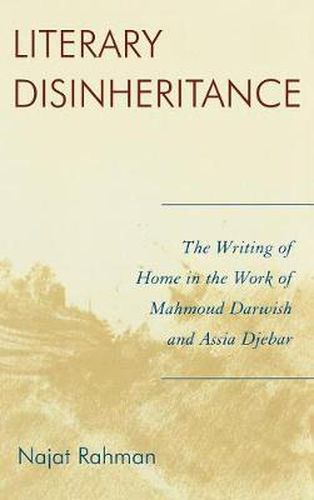Readings Newsletter
Become a Readings Member to make your shopping experience even easier.
Sign in or sign up for free!
You’re not far away from qualifying for FREE standard shipping within Australia
You’ve qualified for FREE standard shipping within Australia
The cart is loading…






Literary Disinheritance examines the shifts in the articulations of home in the works of the Palestinian poet Mahmoud Darwish and the Algerian writer Assia Djebar, considering their writing as an instance of a larger cultural expression in the Arab world. Darwish’s and Djebar’s notions of home respond to textual delineations of heritage that have become historical. They identify a long literary heritage that not only speaks of dispossession and effacement but also suggests that those very predicaments are historically enacted through nationalist and religious readings of inherited stories. The patriarchal narratives that forge collective identity are revisited and reopened; in order to reconstitute the trope of home, they call attention to different facets of discontinuity in their heritage. Author Najat Rahman locates and explores the treatment of these discontinuous moments as the emanate from a rigorous reflection on writing.
$9.00 standard shipping within Australia
FREE standard shipping within Australia for orders over $100.00
Express & International shipping calculated at checkout
Literary Disinheritance examines the shifts in the articulations of home in the works of the Palestinian poet Mahmoud Darwish and the Algerian writer Assia Djebar, considering their writing as an instance of a larger cultural expression in the Arab world. Darwish’s and Djebar’s notions of home respond to textual delineations of heritage that have become historical. They identify a long literary heritage that not only speaks of dispossession and effacement but also suggests that those very predicaments are historically enacted through nationalist and religious readings of inherited stories. The patriarchal narratives that forge collective identity are revisited and reopened; in order to reconstitute the trope of home, they call attention to different facets of discontinuity in their heritage. Author Najat Rahman locates and explores the treatment of these discontinuous moments as the emanate from a rigorous reflection on writing.